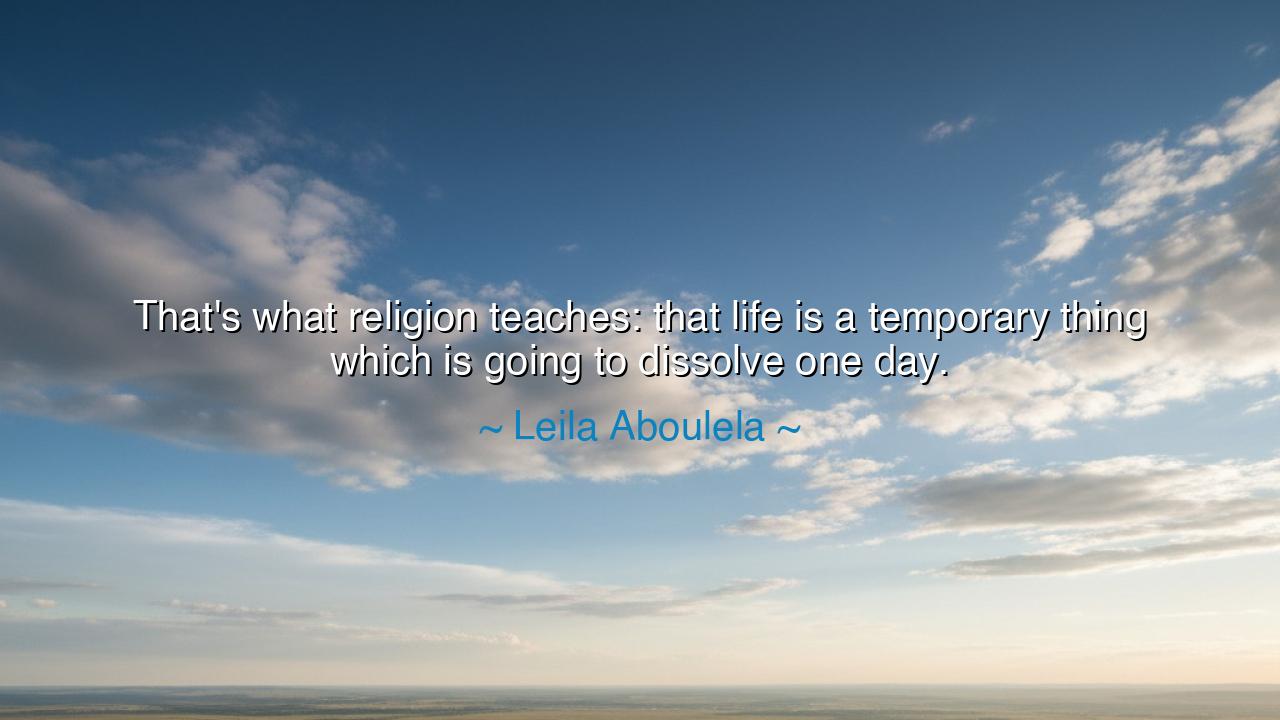
That's what religion teaches: that life is a temporary thing
That's what religion teaches: that life is a temporary thing which is going to dissolve one day.






Leila Aboulela, with the simplicity of truth and the sharpness of a blade, proclaimed: “That’s what religion teaches: that life is a temporary thing which is going to dissolve one day.” In this utterance, she captures the heart of all sacred traditions—the recognition that our days upon this earth are fleeting, that the body is dust, and that the grandeur of the world is but a passing shadow. Life is temporary, like the morning dew upon the grass; it glitters in the first light of dawn, only to vanish when the sun rises higher. To know this is not to despair, but to awaken, to value each breath, each kindness, each act of courage.
The ancients always held this truth before them. The Egyptians built pyramids, not because they thought the body eternal, but because they knew the soul would journey beyond. The Greeks carved upon their temples the words: Know thyself—a reminder that to know oneself is also to know one’s mortality. In every faith, in every age, the teaching echoes: life dissolves, and what remains is the soul’s legacy, its deeds, its love, its faith. Religion, then, is not merely a ritual, but a preparation for eternity, a training of the heart to let go of what cannot last.
Consider the tale of Alexander the Great, conqueror of empires. He stretched his hand across the earth, from Greece to India, and yet at his death, he commanded that his hands be left outside his coffin. Why? To show the world that the master of half the earth departed with nothing. His power, his treasures, his victories—all dissolved, as Leila Aboulela reminds us, because life is but a temporary thing. Only the lessons drawn, the impact upon others, and the memory of his deeds endured.
But this teaching is not meant to crush the spirit. On the contrary, it is meant to set the spirit free. For when one understands that life will dissolve, one no longer clings to possessions with desperation, nor trembles before failure. One begins to see that each day is a gift, each trial an opportunity, each act of compassion a seed sown in eternity. This is why prophets and sages spoke often of death—not to terrify, but to awaken, to stir people from the slumber of trivial pursuits into the nobility of higher purpose.
Indeed, when one sees life as temporary, courage arises. The martyr who gives his life for justice, the mother who sacrifices for her child, the artist who pours his soul into a work knowing he may never see its recognition—all these embody the wisdom of impermanence. They understand that glory and comfort fade, but the spirit that chooses truth, beauty, and love walks in paths that do not perish.
The lesson for us is thus: do not build your foundation upon sand, upon wealth that will rust or fame that will vanish. Instead, build upon eternal things—compassion, integrity, wisdom, and service. If life is temporary, then live it with urgency, but also with serenity. Waste no time in hatred, for hatred dissolves like smoke. Spend much time in love, for love echoes even after the body returns to dust.
Practical actions flow from this truth. Each morning, remind yourself that the day will not return, and so live it fully. When faced with anger, ask: will this matter when my life dissolves? When given the chance to show kindness, act quickly, for tomorrow is not promised. And when you dream, dream boldly, knowing that though life is temporary, the impact of your courage may ripple through generations.
O seeker, remember this: life dissolves, but meaning endures. Religion teaches us not to cling, but to prepare. Prepare your heart with love, prepare your mind with wisdom, prepare your soul with humility. In this way, when the final dissolving comes, you will not fear it—you will walk into eternity as one who has lived fully, bravely, and well.






AAdministratorAdministrator
Welcome, honored guests. Please leave a comment, we will respond soon